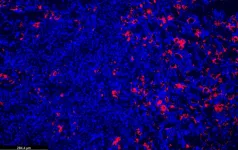(Press-News.org) DURHAM, N.C. -- Throw a tantrum. Threaten, shove aside or steal from your colleagues. Science confirms, yet again, that brutish behavior can be an effective path to power. And not just in humans, but in chimpanzees, too.
A new study appearing April 24 in the journal PeerJ Life and Environment found that male chimps with more bullying, greedy and irritable personalities reached higher rungs of the social ladder and were more successful at siring offspring than their more deferential and conscientious counterparts.
But if that’s the case, researchers ask, why isn’t every chimp a bully?
A team led by researchers at the University of Edinburgh and Duke University followed 28 male chimps living in Gombe National Park in Tanzania.
A previous study of Gombe chimpanzees led by Edinburgh’s Alexander Weiss along with Duke professor Anne Pusey and colleagues showed how some chimpanzees are more sociable, while others are loners. Some lean towards easy-going, while others are more overbearing or quick to pick fights.
Tanzanian field researchers who knew the chimpanzees well performed the personality assessments, based on years of near-daily observations of how each chimpanzee behaved and interacted with other chimps.
In the current study, researchers found that male chimps with certain personality traits -- in this case, a combination of high dominance and low conscientiousness -- tend to fare better in life than others.
“Personality matters,” said Joseph Feldblum, assistant research professor of evolutionary anthropology at Duke and the other lead author of the study.
It may not be shocking to learn that bullying has its perks. But for some researchers, findings like these pose a conundrum: If males with certain personality tendencies are more likely to rise to the top and reproduce, and pass the genes for those traits on to their offspring, then shouldn’t every male be that way?
In other words, why do personality differences exist at all?
“It’s an evolutionary puzzle,” Feldblum said.
One long-held theory is that different personality traits pay off at different points in animals’ lives. Even if being aggressive gives young male chimps an edge, it might backfire when they’re older. Or perhaps certain traits are a liability in youth but an asset in old age.
“Think of the personality traits that lead some people to peak in high school versus later in life,” Weiss said. “It’s a trade-off.”
But when the team tested this idea, using 37 years of data going back to some of Jane Goodall’s early work at Gombe in the 1970s, they found the same personality traits were linked to high rank and reproductive success across the lifespan.
The findings suggest that something else must explain the diversity of personalities in chimpanzees. It might be that the “best” personality to have varies depending on environmental or social conditions, or that a trait that is beneficial to males is costly to females, Feldblum said.
If that were true, then “genes associated with those traits would be kept in the population,” Weiss said.
Not too many years ago, the mere suggestion that animals have personalities at all was considered taboo. Jane Goodall herself was accused of anthropomorphism when she described some of the Gombe chimpanzees as “bolder” or “more fearful” than others, some as “affectionate” and others “cold.”
Since that time, scientists studying creatures ranging from birds to squid have found evidence of distinctive personalities in animals: quirks and idiosyncrasies and ways of relating to the world that remain reasonably stable over time and across situations.
Weiss says personality ratings for animals have proven to be as consistent from one observer to the next as are similar measures of human personality.
“The data just don’t support the skepticism,” Weiss said.
This research was supported by grants from the National Science Foundation (#BCS-9021946, #BCS-0452315, #BCS-0648481, #BCS-9319909, #IIS-0431141, #IOS-1052693, #IOS-1457260, #EF-0905606 and #DGE-1106401), the Carnegie Trust for the Universities of Scotland, the Jane Goodall Institute, the U.S. National Institutes of Health (R01-AI058715), Harris Steel Group, the University of Edinburgh, University of Minnesota, Duke University and the British Academy (PF20/100086).
CITATION: "Personality Traits, Rank Attainment, and Siring Success Throughout the Lives of Male Chimpanzees of Gombe National Park," Alexander Weiss, Joseph T. Feldblum, Drew M. Altschul, D. Anthony Collins, Shadrack Kamenya, Deus Mjungu, Steffen Foerster, Ian C. Gilby, Michael L. Wilson, Anne E. Pusey. PeerJ,April 24, 2023. DOI: 10.7717/peerj.1508.
END
If it pays to be a jerk, why isn’t everyone that way?
Long-term research on chimpanzees offers new clues to the puzzle of personality
2023-04-24
ELSE PRESS RELEASES FROM THIS DATE:
New neurosurgery research: Surgical versus nonsurgical treatment of pituitary apoplexy
2023-04-24
The first prospective study comparing outcomes in patients with pituitary apoplexy—sudden bleeding or death of a pituitary tumor—found that patients managed medically fared as well as those treated surgically in the majority of cases. The multicenter international study, led by Cedars-Sinai investigators, was presented today at the American Association of Neurological Surgeons Scientific Meeting in Los Angeles.
“This is the best data to date on the question of surgery versus medical management in patients with this rare but serious condition,” said Adam Mamelak, MD, co-director ...
AAAS announces winners of the inaugural Mani L. Bhaumik Breakthrough of the Year Award
2023-04-24
The American Association for the Advancement of Science’s (AAAS) inaugural Mani L. Bhaumik Breakthrough of the Year Award — focused on standout contributors to NASA’s James Webb Space Telescope (JWST) — honors three individuals who supported vast swaths of the JWST community over decades and whose persistence amid multiple setbacks ensured the mission’s completion.
The award recognizes Major General Charles Frank Bolden Jr., USMC (Ret), a former administrator of the National Aeronautics and Space Administration (NASA); John Mather, senior project scientist of the JWST since 1995; and Bill Ochs, JWST project manager from 2011 through the telescope’s ...
Do vitamin D levels affect the body’s response to anti-cancer immunotherapy?
2023-04-24
Study’s findings suggest that maintaining normal vitamin D levels may benefit patients.
New research indicates that for patients with advanced skin cancer, it may be important to maintain normal vitamin D levels when receiving immunotherapy medications called immune checkpoint inhibitors. The findings are published by Wiley online in CANCER, a peer-reviewed journal of the American Cancer Society.
Vitamin D has many effects on the body, including regulation of the immune system. To see whether levels of vitamin D might impact the effectiveness of immune checkpoint inhibitors, investigators analyzed the blood of 200 patients with advanced melanoma both before and every 12 weeks ...
Drug combination restores ability of leading treatment to signal for death of blood cancer cells
2023-04-24
Despite the promise of new medications that promote cancer cell death in people with acute myeloid leukemia, leukemic cells often adopt features that let them evade the drugs’ effects within a year.
Now, new research using human tissue samples and mouse models has found that resistance of leukemia cells to a widely prescribed drug called venetoclax occurs because of a rapid increase in the breakdown and turnover of mitochondria, structures inside the cell that help power its functions. In addition to their role in producing energy, mitochondria also tell cells to die under certain adverse conditions.
This process of “programmed cell ...
Increased risk of testicular cancer in people with neurodevelopmental disorders
2023-04-24
A new study by researchers at Uppsala University and Uppsala University Hospital shows that men who have a neurodevelopmental disorder, such as autism and ADHD, also have a slightly increased risk of testicular cancer, or seminoma. This is the first study to show such a link, with the results to be published in the British Journal of Cancer.
Testicular cancer is the most common form of cancer in young men, and its underlying causes are still largely unknown.
“As testicular cancer can be surgically removed, thus curing the disease, it is important to seek care in time if you feel a lump in your testicle,” notes Ingrid ...
Single CT scan in kids low risk for cancers, but 4 or more CTs increases risk
2023-04-24
For children under age 18 years, a single computed tomography (CT) scan is not associated with an increased risk of brain tumours, leukemia or lymphoma, but exposure to 4 or more scans before adulthood more than doubles the risk, according to new research https://www.cmaj.ca/lookup/doi/10.1503/cmaj.221303 in CMAJ (Canadian Medical Association Journal).
Computed tomography in children has increased worldwide in recent decades, but there is conflicting evidence about the risks of cancer from these ...
New programmable smart fabric responds to temperature and electricity
2023-04-24
A new smart material developed by researchers at the University of Waterloo is activated by both heat and electricity, making it the first ever to respond to two different stimuli.
The unique design paves the way for a wide variety of potential applications, including clothing that warms up while you walk from the car to the office in winter and vehicle bumpers that return to their original shape after a collision.
Inexpensively made with polymer nano-composite fibres from recycled plastic, the programmable fabric can change its colour and shape when stimuli are applied.
“As a wearable material alone, it has almost infinite potential ...
International study recommends replacing skull section after treatment for a brain bleed
2023-04-23
A major international trial has concluded that, where possible, surgeons should replace the removed section of the skull following surgery to treat a form of brain haemorrhage. This approach will save patients from having to undergo skull reconstruction further down the line.
The RESCUE-ASDH trial, funded by the UK’s National Institute for Health and Care Research (NIHR), involved 40 centres in 11 countries and involved 450 patients. The results of the trial are published today in the New England Journal of Medicine and are announced at the annual meeting of the American Association of Neurological ...
Achieving prevention and health, rather than more healthcare
2023-04-23
If more people have access to health insurance, we have to be sure the death rates of those with certain chronic conditions are decreasing.
This is one of the statements Gregory Peck, an acute care surgeon and associate professor at Rutgers Robert Wood Johnson Medical School, will be researching on behalf of the National Institute of Diabetes and Digestive and Kidney Diseases (NIDDK) at the National Institutes of Health.
Funded by NIH grants totaling more than $1 million through a recent two-year award from the New Jersey Alliance for Clinical and Translational Science (NJ ACTS), a Rutgers hub of the National Center for Advancing ...
Inflammation ‘brake’ gene may help reveal outcomes of kidney disease
2023-04-23
A discovery about gene variants of an inflammation ‘brake’ brings scientists a step closer to personalised treatment for patients at risk of kidney disease and kidney failure.
Researchers at the Garvan Institute of Medical Research, University of New South Wales, Sydney and Westmead Hospital, found that common genetic variants of TNFAIP3, which increase inflammation in the body, can paradoxically protect the kidneys from damage in the short term.
“We wanted to investigate whether inherited differences in how people regulate inflammation could lead to better or worse kidney health outcomes,” says Professor Shane ...
LAST 30 PRESS RELEASES:
Cancer and inflammation: immunologic interplay, translational advances, and clinical strategies
Bioactive polyphenolic compounds and in vitro anti-degenerative property-based pharmacological propensities of some promising germplasms of Amaranthus hypochondriacus L.
AI-powered companionship: PolyU interfaculty scholar harnesses music and empathetic speech in robots to combat loneliness
Antarctica sits above Earth’s strongest “gravity hole.” Now we know how it got that way
Haircare products made with botanicals protects strands, adds shine
Enhanced pulmonary nodule detection and classification using artificial intelligence on LIDC-IDRI data
Using NBA, study finds that pay differences among top performers can erode cooperation
Korea University, Stanford University, and IESGA launch Water Sustainability Index to combat ESG greenwashing
Molecular glue discovery: large scale instead of lucky strike
Insulin resistance predictor highlights cancer connection
Explaining next-generation solar cells
Slippery ions create a smoother path to blue energy
Magnetic resonance imaging opens the door to better treatments for underdiagnosed atypical Parkinsonisms
National poll finds gaps in community preparedness for teen cardiac emergencies
One strategy to block both drug-resistant bacteria and influenza: new broad-spectrum infection prevention approach validated
Survey: 3 in 4 skip physical therapy homework, stunting progress
College students who spend hours on social media are more likely to be lonely – national US study
Evidence behind intermittent fasting for weight loss fails to match hype
How AI tools like DeepSeek are transforming emotional and mental health care of Chinese youth
Study finds link between sugary drinks and anxiety in young people
Scientists show how to predict world’s deadly scorpion hotspots
ASU researchers to lead AAAS panel on water insecurity in the United States
ASU professor Anne Stone to present at AAAS Conference in Phoenix on ancient origins of modern disease
Proposals for exploring viruses and skin as the next experimental quantum frontiers share US$30,000 science award
ASU researchers showcase scalable tech solutions for older adults living alone with cognitive decline at AAAS 2026
Scientists identify smooth regional trends in fruit fly survival strategies
Antipathy toward snakes? Your parents likely talked you into that at an early age
Sylvester Cancer Tip Sheet for Feb. 2026
Online exposure to medical misinformation concentrated among older adults
Telehealth improves access to genetic services for adult survivors of childhood cancers
[Press-News.org] If it pays to be a jerk, why isn’t everyone that way?Long-term research on chimpanzees offers new clues to the puzzle of personality



